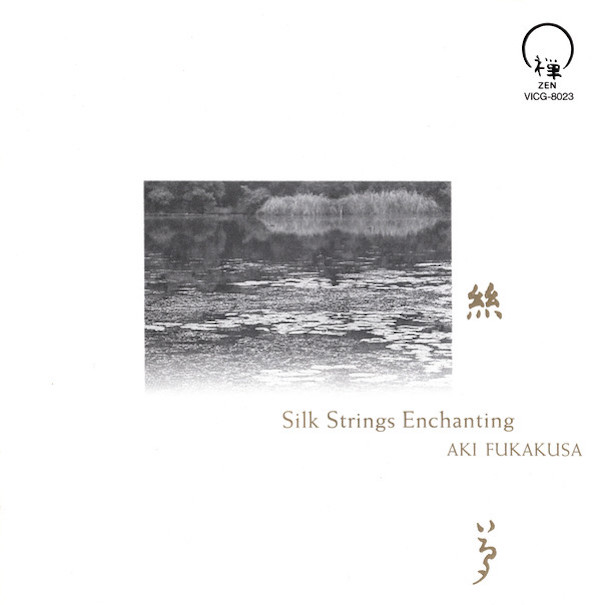
Don’t ask me why but I have something to literally share with you. For some reason I’ve been carrying around Aki Fukakusa’s Silk Strings Enchanting everywhere I go lately. In this weird time in my life, in between moving to a new place and getting rid of the old baggage, I packed up all my record collection and decided this was the album that I wanted to truck around with me. There’s just something about the whole package — its design aesthetic, the quality of its music, and the story behind it — that I’ve seemingly drawn quiet inspiration from to guide me.
It’s not often that I get to introduce a whole new world to you, the reader, but the world of Japan’s Zen record label seems like something we all should be ready to step into.

Zen was a short-lived label that specialized in introducing a new form of Japanese world music into the market. Groups like Ensemble 9, Forest, and solo acts like Aki Fukakusa, Kang Tae Hwan, to name a few, were versed in traditional styles and instrumentation but used this label to release music that expanded its ideas further into new beginnings.
In many ways Aki Fukakusa fit the kind of artist Zen wanted to attract. Bass player of the highly influential Japanese prog group the Far East Family Band, Aki would leave that all behind to sojourn to some no man’s land to learn an instrument he scarcely knew about: the 3 silk string-strung shinkin (or qinqin as its more widely known).
It was in 1979 when Aki ran across one in some misbegotten music shop. In the pre-internet times, Aki would struggle to find any information about it. Working through it by mere trial and error he was able to suss out what kind of strings to use, how to tune it, and what kind of string playing was possible with it. Untied to much of its tradition, Aki figured what would be wrong for him to run it through audio effect pedals and to play it the only way he could understand it.
By the mids ‘80s Aki’s increasingly imaginative shinkin performances and compositions afforded him the opportunity to pursue a solo career where he’d use that instrument to explore neotraditional ideas and New Age music that was far off from the like being created by ex-band mate Kitaro. Two albums released under the Omagatoki label saw him vacillate from brainy experiments and quite melodic, almost pop-leaning music. All things in Aki’s pursuit of showing the range of this instrument.
The turn of the decade brought Aki into the broader Japanese market as he began composing music for TV and live recordings were capturing the attention of those interested in his music. 1989’s 白鷺 ~「玉三郎イン姫路」found him in live recording improvising over images of egrets projected on stage.

When Zen came calling, Aki looked to create a definitive statement to the breath of this instrument. With almost spiritual dedication he’d shut himself off from the rest of the world everyday and practice tirelessly before coming into the studio to record. Then in the course of six days in June, 1991, Aki would lay down to tape nearly everything that you’d hear on this album in one take.
Silk Strings Enchanting (絲夢) eschews largely much of what one would call accompaniment. Songs like “波光 (Wave Light)” are driven by the sonic spaces carved out by Aki’s shinkin playing and various overdubs laid on top. Others, much like “雲にねむる (Dreaming In The Clouds)”, though, are better served with other musicians joining into combine some of the shinkin’s languid tones with ambient electronics and minimal Japanese wind instruments to create something knowingly touching on the nostalgic sentimentality behind some of that era’s best Japanese healing music.
The album’s surprising turns are revealed when Aki takes on vocal duties on tracks like “風と太陽 (Life Lights)” and “蕾・風にあり (Flowering Buds…In The Wind)” using his wonderful voice to instill in them a yearning sound that speaks to the quite “bluesy-esque” melodicism the instrument is known for in the homeland of its creation — this is where this idea of neotraditionalism isn’t too far off.
Of course, the album’s highlights always return back to his sparser compositions like “絲夢 (Silk Strings Enchanting)” and “蓮の咲く池 (Lotus Pond)” where we get to peak inside his more environmentally-influenced music. On the later field recordings of a lotus pond and resonant bells provide a gentle warble that Aki maximizes their existence by simply finding ways to bring his strings into the mix. Space itself is maximized on the title track by using a cavernous reverb as a way to roll in subliminal improvisatory accompaniment. At times the close mic’ing reveals Aki’s breath and finger movements becoming these liminal other sonic planes he’s working from. For being such a paired down album, Silk Strings Enchanting (絲夢) certainly sounds like his most experimental work.

I’m still struggling to understand why this was the album I chose to pare down with me. At the end of the day it’s just three strings on tape trying to find infinite possibilities to their equation. The colors: black and white, revealing grays and gold. Perhaps, there’s something in that will speak to you as it does to me.
